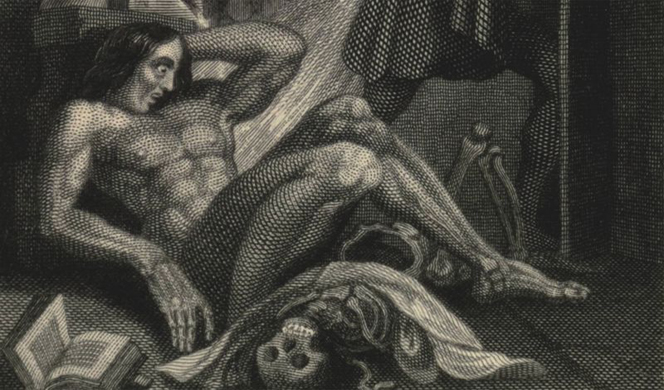
I have this idea for a movie. It concerns the difficulties a Tarantinoesque director experiences while trying to film yet another adaptation of Mary Shelley’s famous novel. The difficulties would arise from Mary Shelley herself, whose angry ghost wreaks enough havoc on the set to finally cancel the whole production. The title I have in mind is “The Last Frankenstein Flick”.
To my knowledge, there are at least seventy film versions of Shelley’s early nineteenth century novel. They run the gamut from serious artistic endeavors to the lowest forms of exploitation. But one thing they all have in common is their tenuous connection with the book. Of course, the best way to correct this regrettable development is to bypass or forget the movies altogether and go to their great literary source.
Mary Shelley’s “Frankenstein” begins with a series of letters written by a voyager to his sister in England. The voyager, while sailing toward the North Pole, observes in the distance a figure of enormous stature riding a sledge across a region of ice. The figure disappears from view, but the next day the voyager and his crew encounter someone else: a half-alive stranger who is taken on board the ship. The stranger’s name is Victor Frankenstein, and Chapter 1 begins the cautionary narration of his tragic life.
Almost everyone has some familiarity with Frankenstein’s story. The classic mad scientist, he becomes obsessed with the idea of producing a new type of human being derived from lifeless matter. ‘A new species would bless me as its creator and source; many happy and excellent natures would owe their being to me.’ His herculean efforts finally succeed, ‘but now that I had finished, the beauty of the dream vanished, and breathless horror and disgust filled my heart’. The ‘new species’ he has created and unleashed on the world turns out to be a murderous monster.
Everything in Shelley’s novel succeeds. Her main characters—including the monster—are all compelling or appealing at some level, and their motives are described with precision and deep insight. She vividly depicts the dangerous intoxication that stimulates efforts directed toward forbidden or exceptionally difficult goals. Also, descriptions of the natural world are rendered with poetic beauty. And then there are the larger prophetic implications—for example, Shelley’s novel has always made me think of Nietzsche and the Nazis. Though the great German philosopher would have loathed what the Nazis were and what they did, they were his creation and monster (at least to a significant degree).
But “Frankenstein” is, above all else, a great horror/science fiction story and should be approached as such. Curl up with it on a comfortable couch in the quiet of the night to maximize its thrilling force; and don’t be overly concerned with the scholarly commentary that surrounds it, let alone the glut of films that have warped it.